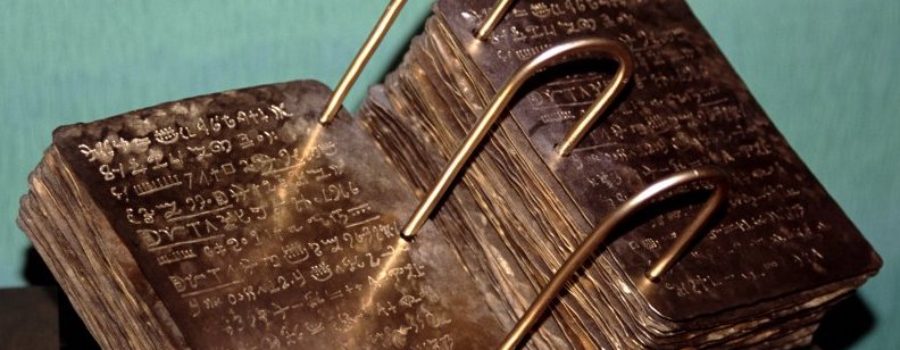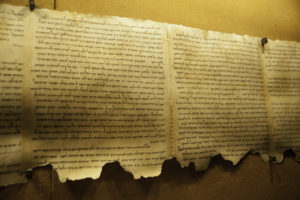In Part 2 of this series, we looked at a few of the prophets and prophecies recorded on the Brass Plates, that do not appear in our current version of the Tanakh. In today’s installment, we’ll consider the origin of the Brass Plates, and the reasons the records were kept.
To better understand the Brass Plates, we must answer the following question:
Why was it so important that Lechi’s family take the “record of the Y’hudim” recorded on the Brass Plates with them to their new promised land?
This is an important question with some surprising answers. Let’s begin with Lechi’s words of explanation to Nefi:
Wherefore, YHWH has commanded me that you and your brothers should go unto the house of Lavan and seek the records and bring them down here into the wilderness. And now behold, your brothers murmur, saying it is a hard thing which I have required of them; but behold, I have not required it of them, but it is a mitzvah of YHWH. (1 Nefi 1:10)
Lechi calls it a mitzvah, or commandment, of YHWH that they retrieve the record. This makes it a rather serious business. If it were merely a good idea, a suggestion, a blessing, or a preference, I do not expect such language would be used. But Lechi’s first introduction of the idea to Nefi presents the need for the record as a commandment, and nothing less.
In Nefi’s efforts to convince his brothers of the importance of the commandment, he explains the following:
And behold, it is wisdom in Elohim that we should obtain these records that we may preserve unto our children the language of our fathers, and also that we may preserve unto them the words which have been spoken by the mouth of all the holy prophets, which have been delivered unto them by the spirit and power of Elohim since the world began, even down unto this present time. And it came to pass that after this manner of language did I persuade my brothers that they might be faithful in keeping the mitzvot of Elohim (1 Nefi 1:12).
I think it’s safe to say, Nefi’s reference to their “children” may be better understood as a desire to bless all their posterity, or seed, in future generations, and not merely their first-generation offspring. His further explanations bear this out:
I remembered the words of YHWH which he spoke unto me in the wilderness, saying that inasmuch as your seed shall keep my mitzvot, they shall prosper in the land of promise. Yes, and I also thought that they could not keep the mitzvot of YHWH according to the Torah of Moshe except they should have the Torah. And I also knew that the Torah was engraved upon the plates of brass (1 Nefi 1:17).
God’s command, the need for the Torah to bless Nefi’s posterity, the need to preserve the language and prophecies—these are all vital considerations. But I don’t think the full importance of this record was discovered until Lechi searched the record itself and spoke about it:
And after they had given thanks unto the Elohim of Isra’el, my father Lechi took the records which were engraved upon the plates of brass and he did search them from the beginning. And he beheld that they did contain the five books of Moshe, which gave an account of the creation of the world and also of Adam and Havah who were our first parents, and also a record of the Y’hudim from the beginning, even down to the commencement of the reign of Tzidkiyahu, king of Y’hudah, and also the prophecies of the holy prophets from the beginning, even down to the commencement of the reign of Tzidkiyahu, and also many prophecies which have been spoken by the mouth of Yirmeyahu. And it came to pass that my father Lechi also found upon the plates of brass a genealogy of his fathers; wherefore, he knew that he was a descendant of Yosef, yes, even that Yosef who was the son of Ya’akov, who was sold into Egypt and who was preserved by the hand of YHWH that he might preserve his father Ya’akov and all his household from perishing with famine. And they were also led out of captivity and out of the land of Egypt by that same Elohim who had preserved them. And thus my father Lechi did discover the genealogy of his fathers. And Lavan also was a descendant of Yosef; wherefore, he and his fathers had kept the records (1 Nefi 1:22).
There’s a lot to unpack in this passage. First, we must consider the origin of the Brass Plates themselves. We’re told they contained a genealogy of Joseph (Yosef)—the same that was sold into Egypt, and who later saved the family of Israel from starvation. Given the likely loss of prior records (along with the birthright garment) when Joseph was sold into slavery, it’s worth considering the possibility Joseph himself had these plates made after he had risen to power and prominence in Egypt.
Think about it. The Brass Plates were written in Egyptian (Moshiyah 1:1). As Vizier of Egypt, Joseph certainly had the wealth and influence to get the plates made; Egypt had the craftsmen and unique ability to fashion metal objects far beyond the abilities of other nations at the time; and as a seer, Joseph had the ability to restore and protect the records of all the holy prophets since the world began. The fact that the plates included Joseph’s genealogy and were kept by his direct descendants, also points to the plates originating with Joseph.
If the Brass Plates did indeed originate with Joseph in Egypt, they must have been carried out of Egypt in the exodus. Moses, being raised in Pharaoh’s court, would certainly have been able to read and write Egyptian, and therefore could have read the records, even if the rest of the Hebrews could not. Likewise, Moses had the ability to record copies of his books in Egyptian on the plates, which accounts for the five books of Moses appearing there in the Egyptian language.
Once the Israelites arrived in Canaan, the records on the Brass Plates continued to be kept in Joseph’s family by his descendants, all the way down until Nefi took them. At some point the plates were moved from the northern lands of Ephraim and Manasseh to Jerusalem, likely to the temple treasury, for safekeeping. This would explain how the records did not disappear with the scattering of the northern kingdom, and how they came to be at Jerusalem at the time of Lechi and Nefi.
And finally, before the destruction of the southern kingdom by Babylon, the plates were rescued by Nefi and spirited away to safety. Given the demonstrated removal of many prophets and prophecies from the Tanakh as it now exists, it’s likely that God’s command and Nefi’s obedience preserved the only remaining copies of these records. Zenos, Zenoch, Ne’um, the Messianic prophecies of Moses, the writings of Joseph, and the words of all the holy prophets from the beginning—all these lost records yet exist in one library, permanently recorded on metal plates, and moved to an entirely different continent for their protection.
When Nefi and his group arrived at the promised land, Nefi received a commandment to continue the record of the prophets:
And it came to pass that YHWH commanded me; wherefore, I did make plates of ore, that I might engrave upon them the record of my people. And upon the plates which I made, I did engrave the record of my father, and also our journeyings in the wilderness, and the prophecies of my father; and also many of my own prophecies have I engraved upon them (1 Nefi 5:34).
I find this passage very interesting. Nefi was commanded to do exactly what Joseph had done—that is, make metal plates and keep a permanent record. How did Nefi even know how to do such a thing? Well, for starters, he had the Brass Plates in his possession to serve as an example. It could be argued that he quite literally continued the record initiated by Joseph and kept by Joseph’s posterity, including by Nefi and those who came after him. The Stick of Joseph, indeed.
Metal plates are permanent. They cannot be altered without being destroyed and re-made at great effort and sacrifice. Records kept on metal plates will literally last for thousands of years, providing the metal used is not subject to corrosion.
Nefi’s brother, Ya’akov, best summarized the purpose of writing on metal plates:
Now behold, it came to pass that I, Ya’akov, having ministered much unto my people in word, and I can write but a few of my words because of the difficulty of engraving our words upon plates; and we know that the things which we write upon plates must endure, but whatsoever things we write upon anything except it be upon plates must perish and vanish away; but we can write a few words upon plates which will give our children, and also our beloved brothers, a small degree of knowledge concerning us, or concerning their fathers. Now in this thing we do rejoice, and we labor diligently to engrave these words upon plates, hoping that our beloved brothers and our children will receive them with thankful hearts and look upon them, that they may learn with joy, and not with sorrow, neither with contempt, concerning their first parents. For, for this intent have we written these things: that they may know that we knew of Mashiach, and we had a hope of his glory many hundred years before his coming. And not only we ourselves had a hope of his glory, but also all the holy prophets which were before us (Ya’akov 3:1).
Ya’akov’s summary includes the need to preserve the record, that sacred words could endure, unchanged for many generations, so that future generations would know the truth of Messiah. In other words, the records were kept on metal plates so that what ultimately happened to the Tanakh would not happen to the Nefite records.
It is therefore no surprise that God didn’t suggest, but rather commanded Nefi to not only retrieve the brass plates from Jerusalem, but also to fashion his own plates to be recorded and passed down by his posterity, so the teachings about Messiah would never again be lost, removed, or destroyed.
Regarding one of his sets of plates, Nefi wrote the following:
Wherefore, YHWH has commanded me to make these plates for a wise purpose in him, which purpose I know not. But YHWH knows all things from the beginning; wherefore, he prepares a way to accomplish all his works among the children of men. For behold, he has all power unto the fulfilling of all his words. And thus it is (1 Nefi 2:14).
Thus it is, indeed.
Coming up in Part 4, we’ll consider the future destiny of the Plates of Brass and their prophecies.






Leave a Reply